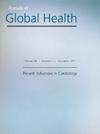Prevalence of Sexually Transmitted Infections and Predictors for Loss to Follow Up among Marginalized Homeless and Migrant Communities: a Cross-Sectional Study
IF 2.6
4区 医学
Q2 PUBLIC, ENVIRONMENTAL & OCCUPATIONAL HEALTH
引用次数: 0
Abstract
Background: In Europe and Italy, marginalized communities have a higher risk for both contracting sexually transmitted infections (STI) and progressing towards adverse outcomes. Objectives: This study focuses on the screening of HIV, HBV, HCV, and syphilis among homeless individuals and agricultural migrant workers living in Apulia, Italy. It aims to assess STI prevalence and investigate factors that might hinder return to collect test results. In addition, it explores STI knowledge, attitudes, and practices among these vulnerable populations. Methods: A cross-sectional study was conducted from September 1, 2022, to September 30, 2023. Participants were recruited from community health centers and migrant camps. Blood tests for HBV, HCV, HIV, and syphilis were performed, and Knowledge, Attitude, and Practices (KAP) survey were conducted via face-to-face interviews. Descriptive and logistic regression analyses were used to assess factors influencing the return for test results. Results: A total of 149 persons were recruited, including 64 agricultural migrant workers and 85 homeless people. Overall, 24.8% (n = 37) tested positive for at least one infection, and only 50.3% (n = 75) of the screened participants returned to collect their test results. Significant disparities in STI knowledge and healthcare access were observed between the two populations, with only 14.1% (n = 9) of migrants having access to primary healthcare. At multivariable analysis, the strongest predictor for not returning for test results was being positive for HCV. Conclusions: Among homeless people and agricultural migrant workers, STI prevalence was high, and only half of the population returned to collect test results. The study underscores the urgent need for targeted interventions and policy reevaluation to address healthcare disparities in marginalized communities.被边缘化的无家可归者和移民群体中性传播感染的流行率和失去随访的预测因素:一项横断面研究
背景:在欧洲和意大利,边缘化群体感染性传播疾病 (STI) 并导致不良后果的风险较高。研究目的本研究的重点是对居住在意大利阿普利亚的无家可归者和农业移民工人进行 HIV、HBV、HCV 和梅毒筛查。研究旨在评估性传播感染的流行率,并调查可能阻碍返回收集检测结果的因素。此外,该研究还探讨了这些弱势群体对性传播疾病的认识、态度和做法。研究方法2022 年 9 月 1 日至 2023 年 9 月 30 日进行了一项横断面研究。研究人员从社区卫生中心和移民营地招募。对参与者进行了乙肝病毒、丙肝病毒、艾滋病病毒和梅毒的血液检测,并通过面对面访谈进行了知识、态度和实践(KAP)调查。采用描述性分析和逻辑回归分析来评估影响返回检测结果的因素。结果共招募了 149 人,包括 64 名农业移民工人和 85 名无家可归者。总体而言,24.8%(n = 37)的人至少有一种感染呈阳性,只有 50.3%(n = 75)的受检者返回领取检测结果。两种人群在性传播感染知识和医疗服务方面存在显著差异,只有 14.1%(n = 9)的移民能够获得初级医疗服务。在多变量分析中,丙型肝炎病毒呈阳性是不返回领取检测结果的最大预测因素。结论在无家可归者和农业移民工人中,性传播感染的发病率很高,只有一半的人返回采集检测结果。这项研究强调,迫切需要采取有针对性的干预措施并重新评估政策,以解决边缘化社区的医疗保健差异问题。
本文章由计算机程序翻译,如有差异,请以英文原文为准。
求助全文
约1分钟内获得全文
求助全文
来源期刊

Annals of Global Health
PUBLIC, ENVIRONMENTAL & OCCUPATIONAL HEALTH-
CiteScore
5.30
自引率
3.40%
发文量
95
审稿时长
11 weeks
期刊介绍:
ANNALS OF GLOBAL HEALTH is a peer-reviewed, open access journal focused on global health. The journal’s mission is to advance and disseminate knowledge of global health. Its goals are improve the health and well-being of all people, advance health equity and promote wise stewardship of the earth’s environment.
The journal is published by the Boston College Global Public Health Program. It was founded in 1934 by the Icahn School of Medicine at Mount Sinai as the Mount Sinai Journal of Medicine. It is a partner journal of the Consortium of Universities for Global Health.
文献相关原料
| 公司名称 | 产品信息 | 采购帮参考价格 |
|---|
 求助内容:
求助内容: 应助结果提醒方式:
应助结果提醒方式:


